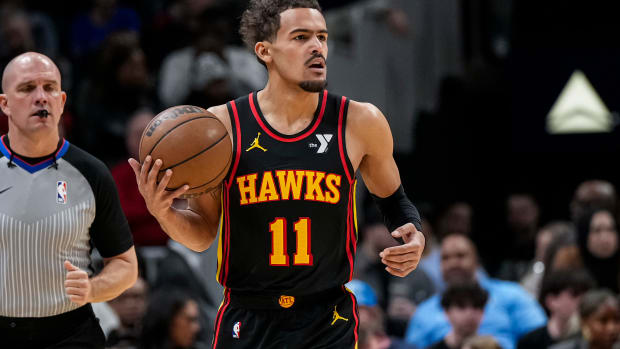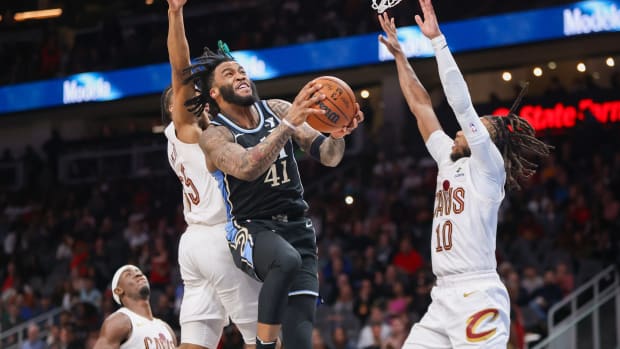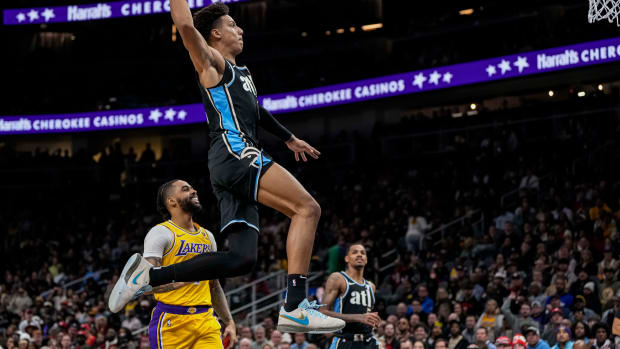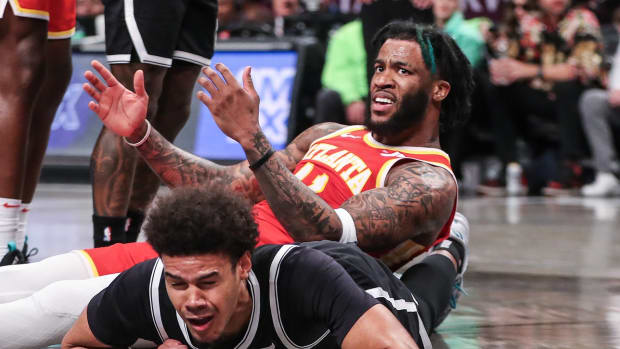2019-20 NBA Awards: Coach and Executive of the Year
With MVP, All-NBA, All-Defense, and All-Rookie recognitions taken care of, let’s continue our 2019-20 season awards series by acknowledging some of the architects behind their teams’ success with Coach of the Year and Executive of the Year.
Coach of the Year
1. Nick Nurse
2. Mike Budenholzer
3. Billy Donovan
It feels early to declare Nurse, in just his second year as a head coach, the best coach in the NBA, but he’s made a strong case over the last two seasons and more than earned a place on this ballot. Despite losing the NBA’s reigning Finals MVP (Kawhi Leonard) and a solid starter on the wing (Danny Green), the Raptors merrily chugged along to a regular-season point differential nearly identical to last year’s title team’s while playing one of the most aesthetically pleasing styles in the league.
Nurse isn’t afraid to get weird (even in last year’s Finals) and continued finding creative ways to help the league’s most adaptable team win games this season. He employed zone defenses, sprung full-court traps, played two-point guard and three-big man lineups, and used nearly every player in the rotation to some positive effect. Toronto abounds with smart, unselfish two-way players, but credit also belongs to Nurse for having the intellectual flexibility and tactical wherewithal to get the most out of them.
Led by their second-ranked defense, the Raptors played to the fifth-best net rating in the NBA and a 56-win pace. They strung together a 15-game win streak before the All-Star break, even with injuries plaguing the roster. Marc Gasol (28 games), Norman Powell (20), Fred VanVleet (18), Serge Ibaka (14), Kyle Lowry (12), and Pascal Siakam (11) all missed significant time, yet Toronto never missed a beat. The institutional knowledge required for a roster to compensate for those kinds of losses is incredibly difficult to instill, but Nurse and his staff have done so in short order.
Budenholzer -- the reigning Coach of the Year and architect of a historically dominant two-way juggernaut -- is the only coach with a case over Nurse. His first year in Milwaukee, Coach Bud revolutionized a stagnant offense with movement and spacing while engineering a smarter and more disciplined defense. This season, the Bucks somehow improved on both ends, and Budenholzer deserves credit for getting Milwaukee to the point of nightly, effortless regular-season dominance.
But you can assign outsize credit to Giannis Antetokounmpo for the Bucks’ success in a way that can’t be done for Lowry, Siakam, or Gasol. Milwaukee’s offensive and defensive systems are slightly more dependent on personnel, whereas the Raptors’ success feels more like a product of scheme and coaching (though certainly there aren’t many players who could make it sing like Lowry, Gasol, and Siakam).
Billy Donovan, Michael Malone, Rick Carlisle, Doc Rivers, Frank Vogel, Brad Stevens, Erik Spoelstra, and Nate McMillan could all lay claim to third place on the ballot, but Donovan did the most with what he had at his disposal (despite the Thunder amassing a lower net rating than the other seven teams). Prior to the season, there was hardly a consensus that the Thunder would even contend for the postseason, yet when the season paused, they sit just a game out of home-court advantage in the first round.
Chris Paul’s resurgence sparked the bulk of Oklahoma City’s success, but Donovan is largely responsible for its reinvention. With so much new personnel in the fold, the Thunder played a more controlled and disciplined style on both ends of the floor, putting together a top-10 defense and outperforming their point differential by the fourth-highest margin in the league. Donovan took full advantage of the increased flexibility Paul and others afforded him, spreading playmaking duties more equitably, unlocking Steven Adams’ high-post passing, and playing more defensively tenable three-guard lineups.
Vogel and Rivers are both hurt in this discussion by coaching two superstars each, while expectations were already high for Malone’s Nuggets, led by MVP candidate Nikola Jokić. In Dallas, Carlisle unleashed Luka Dončić as role players like Dwight Powell, Maxi Kleber, and Tim Hardaway Jr. shined. Stevens remains one of the preeminent tacticians in the league, and the Celtics ranked in the top five in both offensive and defensive efficiency without a superstar anchor on either end. But relative to preseason expectations, Boston didn’t exceed its mark by as much as Oklahoma City -- or even Indiana -- did.
Executive of the Year
1. Lawrence Frank
2. Sam Presti
3. David Griffin
For the second consecutive year, the executive who acquired Kawhi Leonard leads the race for Executive of the Year. Such is the power of the superstar in the modern NBA. Signing Leonard was the culmination of years of maneuvering, beginning with the deal that sent Blake Griffin to Detroit -- the first major move of Lawrence Frank’s tenure. That trade set into motion a chain of events that involved Tobias Harris, Boban Marjanović, Shai Gilgeous-Alexander, a dizzying number of draft picks, and, eventually, Leonard and George.
To some degree, it’s fair to criticize Frank and company for giving up too much to acquire George from Oklahoma City -- even under the (reported) condition that trading for George was the only way to lure Leonard to Los Angeles. Perhaps the Clippers will eventually wish they had one of the seven (!) first-round picks they surrendered to the Thunder, but it’s unlikely any of them would have moved L.A. closer to winning a title than their two stars do. The Clippers likely would have given up Gilgeous-Alexander no matter what, and Danilo Gallinari would have been superfluous on a team with two elite primary creators. When you have an opportunity to win a championship, you seize it.
Acquiring Moe Harkless and a 2023 first-rounder over the offseason was a shrewd piece of business that helped the Clippers down the line. That pick was included in the George trade and L.A. later flipped Harkless for Marcus Morris to solidify one of the most imposing lineups in the West. Toss in signing value contracts with Patrick Beverley, Ivica Zubać, Rodney McGruder, and Patrick Patterson, and the Clippers’ front office executed its roster construction as close to perfectly as a team can reasonably come.
It’s clear already that both Oklahoma City and Los Angeles are better off having made the George trade. The Thunder are better on the floor in the short term and more flexible in the long term than they were a year ago. They received a rare opportunity to rebuild without tanking by dealing George, and in trading Russell Westbrook for Chris Paul, they upgraded at point guard while taking on no additional annual salary and shedding the final year of Westbrook’s contract.
It’s hard to give David Griffin too much credit for winning the lottery or drafting Zion Williamson first overall, but he does deserve praise for constructing an environment in which the rookie could immediately thrive. He was smart to capitalize on Utah’s need to shed Derrick Favors, while free-agent acquisitions J.J. Redick and Nicolo Melli provided reliable shooting for a team that needed it. Most importantly, Griffin netted close to the best possible return for Anthony Davis by getting three quality rotation players -- even if he didn’t see this kind of improvement coming from Brandon Ingram. New Orleans’ moves didn’t entirely pay off due to factors beyond Griffin’s control, but the process behind nearly every move was sound, and if the season resumes, the Pelicans may have time enough to reap the rewards.




